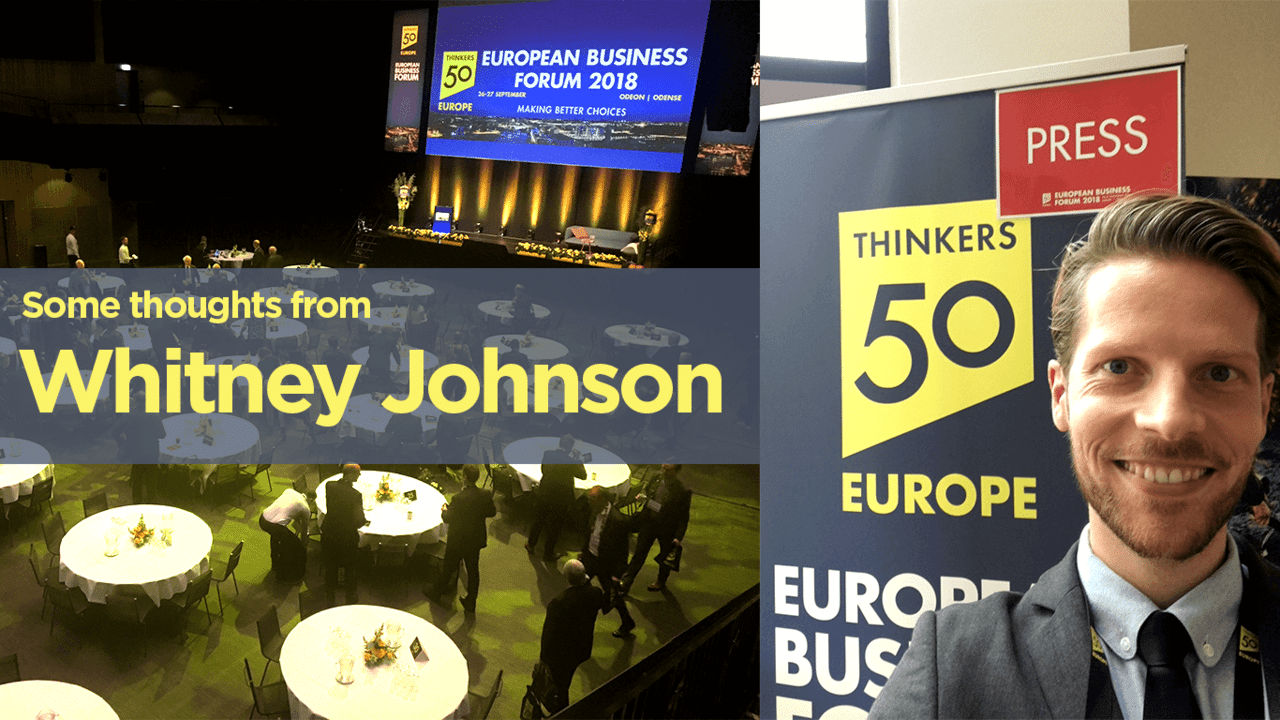

The arena has changed, and many companies are becoming B Corps, sending the signal that it is time to put humans before machines, and hold each other accountable for our actions.
I have got to meet some of the thinkers, who are an inspiration to creating a better world through leadership all over the world. In this article you get a brief insight in the thoughts from a thought leader on disruption: Whitney Johnson.
People tend to overvalue what they cannot do and underestimate what they do easily
Whitney Johnson and how to disrupt yourself
Change makes us anxious. Fact of life. The world changes a lot these days. Another fact of life.
Therefore, we need to change ourselves to release some of the anxiety.
Disruption is based on a framework of change, and Whitney Johnson’s main message is that we need to disrupt ourselves to make change happen. But we also need to accept that disruption will happen within a process of scaryness and lonelyness.
Personal disruption opens up markets with no competition
Most of us know the stories of how Apple disrupted Nokia or how Netflix disrupted Blockbuster. At one time it was awesome to be Blockbuster, and then, suddenly, it sucked.
When it comes to personal disruption, on the other hand, you are both Netflix and Blockbuster. You are disrupting yourself. So, does it only suck, or is everything awesome?
If you ask Whitney Johnson (and I did), there is a lot of opportunities in personal disruption. But you need to be brave. The disruptive movement must come from within, and that means playing where no one else is playing.
The upside is that if you play, where no one else is playing, you have got no competition, and you are also opening a door for your company. The downside is that it will feel both scary, and sometimes lonely, to walk down the disruptive path.
Find your strengths
You will most likely be the best disrupter, when you use your strengths. This is where you have advantages that others do not. One way to find your strenghts is to ask yourself two questions:
This is your genius. Unfortunately, we tend to ignore the things we are often complimented for. We think that what we do easily, everyone does easily. We tend to overvalue what we cannot do, and underestimate what we do easily.
Instead, start thinking that what you find easy, might be because you are actually really good at it. This is your strength.
On the other hand, the more successful we are, the more we think we deserve our success. Then we start thinking: “This is the way things are and will be and should continue to be”. But you need to step back to grow, and give failure its due.
So, find your strengths, but do not get lazy, once you have found them. Keep learning. Keep failing. And keep disrupting.
Keeping your employees in the sweet spot
When we are eager to learn, and not too challenged, we are great employees. We are productive and engaged. We are in the sweet spot.
When we are too inexperienced, we fail too much and work slowly. But we also ask a lot of good questions that move our company forward.
When we master, what we do, we tend to become unengaged and bored. Then we start looking for other places to work or stop being productive at the place, we do work. But we also possess the great overview and valuable insights in the company.
As a leader, make sure to keep most of your employees in the sweet spot. But do not forget to have employees in both ends of the scale too. Whitney Johnson suggests a 15% – 70% – 15% grouping.
We need learners to achieve disruption, innovation, growth and development. But these learners need inspiration and guidance. And they need to fail. But they also need to get rid of the shame and anxiety that follows from failing and disruption.
This is where you play a key role.
It is shame, not failure that stops you from disruption. But if the process you are in seems scary and lonely, you are on the right path
Get more thoughts from some of today’s greatest thinkers in the next couple of days right here.

Thinkers50 Limited
The Studio
Highfield Lane
Wargrave RG10 8PZ
United Kingdom

Thinkers50 Limited
The Studio
Highfield Lane
Wargrave RG10 8PZ
United Kingdom

| Cookie | Duration | Description |
|---|---|---|
| LANG | 9 hours | Linkedin set this cookie to set user's preferred language. |
| nsid | session | This cookie is set by the provider PayPal to enable the PayPal payment service in the website. |
| sp_landing | 1 day | The sp_landing is set by Spotify to implement audio content from Spotify on the website and also registers information on user interaction related to the audio content. |
| sp_t | 1 year | The sp_t cookie is set by Spotify to implement audio content from Spotify on the website and also registers information on user interaction related to the audio content. |
| tsrce | 3 days | PayPal sets this cookie to enable the PayPal payment service in the website. |
| x-pp-s | session | PayPal sets this cookie to process payments on the site. |
| __cf_bm | 30 minutes | This cookie, set by Cloudflare, is used to support Cloudflare Bot Management. |
| Cookie | Duration | Description |
|---|---|---|
| l7_az | 30 minutes | This cookie is necessary for the PayPal login-function on the website. |
| Cookie | Duration | Description |
|---|---|---|
| CONSENT | 2 years | YouTube sets this cookie via embedded youtube-videos and registers anonymous statistical data. |
| _ga | 2 years | The _ga cookie, installed by Google Analytics, calculates visitor, session and campaign data and also keeps track of site usage for the site's analytics report. The cookie stores information anonymously and assigns a randomly generated number to recognize unique visitors. |
| _gat_gtag_UA_10408481_1 | 1 minute | Set by Google to distinguish users. |
| _ga_ZP8HQ8RZXS | 2 years | This cookie is installed by Google Analytics. |
| _gid | 1 day | Installed by Google Analytics, _gid cookie stores information on how visitors use a website, while also creating an analytics report of the website's performance. Some of the data that are collected include the number of visitors, their source, and the pages they visit anonymously. |
| Cookie | Duration | Description |
|---|---|---|
| NID | 6 months | NID cookie, set by Google, is used for advertising purposes; to limit the number of times the user sees an ad, to mute unwanted ads, and to measure the effectiveness of ads. |
| test_cookie | 15 minutes | The test_cookie is set by doubleclick.net and is used to determine if the user's browser supports cookies. |
| VISITOR_INFO1_LIVE | 5 months 27 days | A cookie set by YouTube to measure bandwidth that determines whether the user gets the new or old player interface. |
| YSC | session | YSC cookie is set by Youtube and is used to track the views of embedded videos on Youtube pages. |
| yt-remote-connected-devices | never | YouTube sets this cookie to store the video preferences of the user using embedded YouTube video. |
| yt-remote-device-id | never | YouTube sets this cookie to store the video preferences of the user using embedded YouTube video. |
| yt.innertube::nextId | never | This cookie, set by YouTube, registers a unique ID to store data on what videos from YouTube the user has seen. |
| yt.innertube::requests | never | This cookie, set by YouTube, registers a unique ID to store data on what videos from YouTube the user has seen. |
| Cookie | Duration | Description |
|---|---|---|
| DEVICE_INFO | 5 months 27 days | No description |
| loglevel | never | No description available. |
| m | 2 years | No description available. |
Thinkers50 Limited has updated its Privacy Policy on 28 March 2024 with several amendments and additions to the previous version, to fully incorporate to the text information required by current applicable date protection regulation. Processing of the personal data of Thinkers50’s customers, potential customers and other stakeholders has not been changed essentially, but the texts have been clarified and amended to give more detailed information of the processing activities.